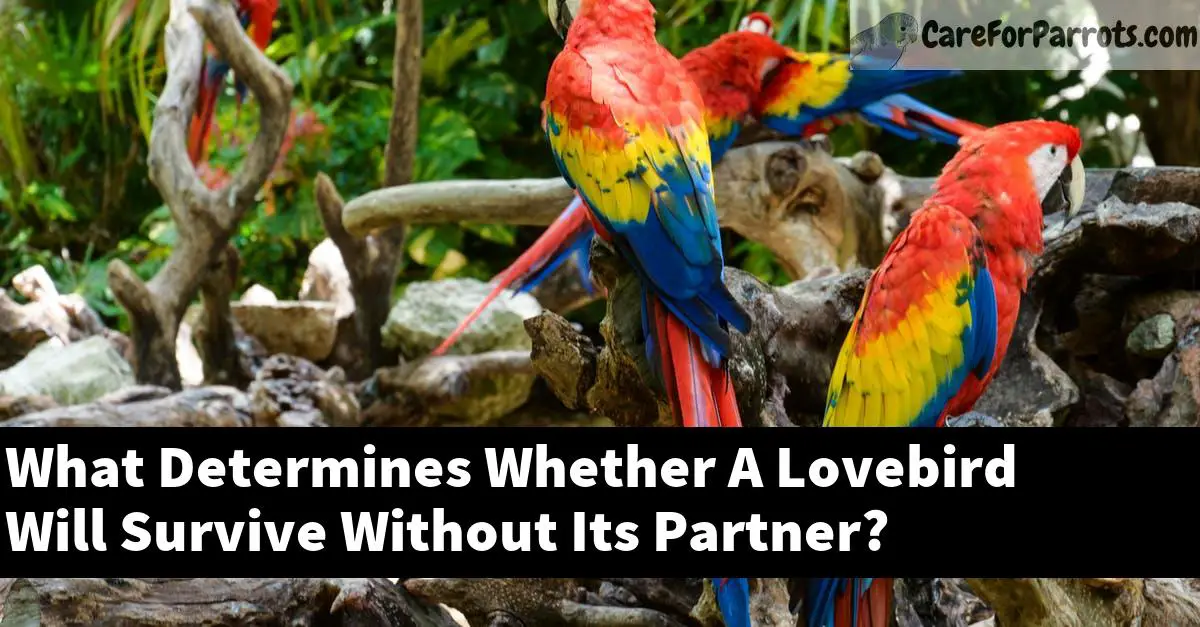We’ve all heard about lovebirds and the bond they share with their partners. These small, colorful parrots are known for their social nature and strong pair bonds, often leading people to wonder what would happen if one partner were to pass away.
In this article, we’ll explore the factors that determine whether a lovebird can survive without its partner, touching upon aspects such as their social needs, adaptability, and the role of human caretakers.
While it’s true that losing a partner can be quite challenging for a lovebird, the good news is that these intelligent creatures can adapt and find new ways to thrive. So, join us as we delve deeper into the world of lovebirds, and learn about their resilience and what you can do to help them overcome such a loss.
Table of Contents
The Social Needs of Lovebirds
Understanding Lovebird Bonds
Lovebirds are known for their strong pair bonds, often sitting side by side, preening to each other, and sharing food. This close relationship is crucial for their emotional well-being, and it helps to ensure their survival in the wild.
The Importance of Social Interaction
Even though lovebirds are strongly bonded to their partners, they also rely on the social interaction provided by their flock. In the wild, lovebirds live in groups, where they can learn from and interact with other birds. This social aspect plays a significant role in their overall well-being and ability to adapt to new situations.
Adaptability and Resilience of Lovebirds
Coping with Loss
When a lovebird loses its partner, it can experience stress and loneliness. However, these birds are quite adaptable and can find new ways to cope with the loss. They might seek out new companionship, either with another lovebird or a different bird species, which can help alleviate their loneliness.
The Role of Human Caretakers
For captive lovebirds, human caretakers play a crucial role in their ability to adapt to the loss of a partner. By providing a safe, comfortable environment and engaging in regular interaction with the lovebird, caretakers can help ease the transition and promote emotional well-being.
Factors That Influence Survival
Health and Age
A lovebird’s health and age can significantly impact its ability to survive without a partner. Younger and healthier birds may have an easier time adapting to the loss, while older or sickly birds might struggle more.
Environmental Factors
The quality of the environment in which the lovebird lives can also influence its ability to cope with loss. A lovebird living in a clean, comfortable, and stimulating environment will likely fare better than one living in less-than-ideal conditions.
Matiniy 2 Pcs Pirate Parrot on Shoulder Life Sized Artificial Parrot Toy for Costume Dress-up Accessory for Halloween Party(Multicolor)
$14.99 (as of 24/02/2026 22:51 GMT +03:00 - More infoProduct prices and availability are accurate as of the date/time indicated and are subject to change. Any price and availability information displayed on [relevant Amazon Site(s), as applicable] at the time of purchase will apply to the purchase of this product.)Bird Toys, Parrot Toys for Large Birds,Natural Corn cob and Loofah Slices Bird chew Toys for African Grey Parrots, Macaws, Cockatoos, Amazon Parrot and other Small and Medium-Sized Parrot (Colorful)
$12.97 ($12.97 / count) (as of 25/02/2026 00:17 GMT +03:00 - More infoProduct prices and availability are accurate as of the date/time indicated and are subject to change. Any price and availability information displayed on [relevant Amazon Site(s), as applicable] at the time of purchase will apply to the purchase of this product.)Kaytee Fiesta Parrot Food, Nutritious and Fun Blend, Supports Skin, Feather, Digestion, Brain and Heart Health, 4.5 pounds
16% OffHelping Your Lovebird Thrive
Introducing a New Companion
One way to help a lovebird cope with the loss of its partner is to introduce a new companion. It’s important to be patient and allow the birds to get to know each other gradually, as they may not immediately form a bond.
Providing Mental Stimulation
Providing toys, puzzles, and foraging opportunities can help keep a lovebird mentally stimulated and engaged, which can be especially important after the loss of a partner. This can help alleviate boredom and loneliness.
Conclusion
In conclusion, a lovebird’s ability to survive without its partner depends on a variety of factors, including its social needs, adaptability, and the support provided by its human caretakers. By understanding these factors and providing a nurturing environment, you can help your lovebird thrive even in the absence of its partner.
FAQ
1. Do lovebirds always need a companion?
While lovebirds do benefit from companionship, they can also adapt to living alone, especially if they receive regular interaction from their human caretakers.
2. How long does it take for a lovebird to bond with a new companion?
The bonding process between lovebirds can vary greatly, taking anywhere from a few days to several weeks or even months. Patience and close observation are essential during this period to ensure the birds are compatible and adjusting well to each other.
3. Can lovebirds bond with other bird species?
Yes, lovebirds can sometimes form bonds with other bird species, especially if they are of similar size and temperament. However, it’s important to monitor their interactions closely to ensure they are getting along and not exhibiting aggressive behavior.
4. What signs should I look for to determine if my lovebird is coping well after the loss of its partner?
Some signs that your lovebird is adapting well after the loss of its partner include maintaining a healthy appetite, preening itself, engaging with toys and its environment, and showing interest in interacting with you. If your lovebird exhibits signs of depression, such as lethargy, loss of appetite, or excessive sleeping, it’s essential to consult with an avian veterinarian for guidance.
5. Can I prevent my lovebird from feeling lonely after the loss of its partner?
While it’s impossible to entirely prevent feelings of loneliness, you can help alleviate these feelings by providing your lovebird with plenty of interaction, mental stimulation, and, if possible, a new companion. Ensuring that your lovebird’s environment is clean, comfortable, and engaging will also contribute to its overall well-being during this challenging time.
























